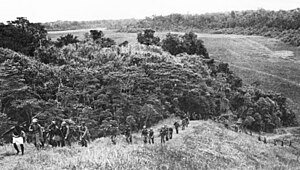Carlson's patrol
| Carlson's patrol | |||||||
|---|---|---|---|---|---|---|---|
| Part of the Pacific Theater of World War II | |||||||
 Native Solomon Islanders guide US 2nd Marine Raiders in pursuit of Japanese forces on Guadalcanal in November 1942 |
|||||||
|
|||||||
| Belligerents | |||||||
|
|
|
||||||
| Commanders and leaders | |||||||
| Strength | |||||||
|
700 |
2,500 | ||||||
| Casualties and losses | |||||||
|
17 wounded |
488 killed | ||||||
700
Coordinates: 9°26′6.33″S 159°57′4.46″E / 9.4350917°S 159.9512389°E
Carlson's patrol, also known as The Long Patrol or Carlson's long patrol, was an operation by the 2nd Marine Raider Battalion under the command of Evans Carlson during the Guadalcanal Campaign against the Imperial Japanese Army from 6 November to 4 December 1942. In the operation, the 2nd Raiders attacked forces under the command of Toshinari Shōji, which were escaping from an attempted encirclement in the Koli Point area on Guadalcanal and attempting to rejoin other Japanese army units on the opposite side of the U.S. Lunga perimeter.
In a series of small unit engagements over 29 days, the 2nd Raiders killed almost 500 Japanese soldiers while suffering only 16 killed, although many were afflicted by disease. The raiders also captured a Japanese field gun that was delivering harassing fire on Henderson Field, the Allied airfield at Lunga Point on Guadalcanal.
On 7 August 1942, Allied forces (primarily U.S. Marines) landed on Guadalcanal, Tulagi, and Florida Islands in the Solomon Islands. Their mission was to deny the Japanese use of the islands as bases for threatening the supply routes between the U.S. and Australia, and to secure the islands as starting points for a campaign to isolate the major Japanese base at Rabaul while also supporting the Allied New Guinea campaign. The landings initiated the six-month-long Guadalcanal Campaign.
...
Wikipedia
